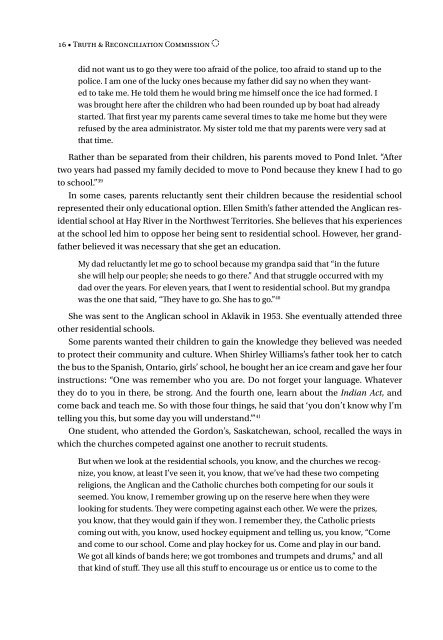The Survivors Speak
1MB8J05
1MB8J05
You also want an ePaper? Increase the reach of your titles
YUMPU automatically turns print PDFs into web optimized ePapers that Google loves.
16 • Truth & Reconciliation Commission<br />
did not want us to go they were too afraid of the police, too afraid to stand up to the<br />
police. I am one of the lucky ones because my father did say no when they wanted<br />
to take me. He told them he would bring me himself once the ice had formed. I<br />
was brought here after the children who had been rounded up by boat had already<br />
started. That first year my parents came several times to take me home but they were<br />
refused by the area administrator. My sister told me that my parents were very sad at<br />
that time.<br />
Rather than be separated from their children, his parents moved to Pond Inlet. “After<br />
two years had passed my family decided to move to Pond because they knew I had to go<br />
to school.” 39<br />
In some cases, parents reluctantly sent their children because the residential school<br />
represented their only educational option. Ellen Smith’s father attended the Anglican residential<br />
school at Hay River in the Northwest Territories. She believes that his experiences<br />
at the school led him to oppose her being sent to residential school. However, her grandfather<br />
believed it was necessary that she get an education.<br />
My dad reluctantly let me go to school because my grandpa said that “in the future<br />
she will help our people; she needs to go there.” And that struggle occurred with my<br />
dad over the years. For eleven years, that I went to residential school. But my grandpa<br />
was the one that said, “<strong>The</strong>y have to go. She has to go.” 40<br />
She was sent to the Anglican school in Aklavik in 1953. She eventually attended three<br />
other residential schools.<br />
Some parents wanted their children to gain the knowledge they believed was needed<br />
to protect their community and culture. When Shirley Williams’s father took her to catch<br />
the bus to the Spanish, Ontario, girls’ school, he bought her an ice cream and gave her four<br />
instructions: “One was remember who you are. Do not forget your language. Whatever<br />
they do to you in there, be strong. And the fourth one, learn about the Indian Act, and<br />
come back and teach me. So with those four things, he said that ‘you don’t know why I’m<br />
telling you this, but some day you will understand.’” 41<br />
One student, who attended the Gordon’s, Saskatchewan, school, recalled the ways in<br />
which the churches competed against one another to recruit students.<br />
But when we look at the residential schools, you know, and the churches we recognize,<br />
you know, at least I’ve seen it, you know, that we’ve had these two competing<br />
religions, the Anglican and the Catholic churches both competing for our souls it<br />
seemed. You know, I remember growing up on the reserve here when they were<br />
looking for students. <strong>The</strong>y were competing against each other. We were the prizes,<br />
you know, that they would gain if they won. I remember they, the Catholic priests<br />
coming out with, you know, used hockey equipment and telling us, you know, “Come<br />
and come to our school. Come and play hockey for us. Come and play in our band.<br />
We got all kinds of bands here; we got trombones and trumpets and drums,” and all<br />
that kind of stuff. <strong>The</strong>y use all this stuff to encourage us or entice us to come to the


